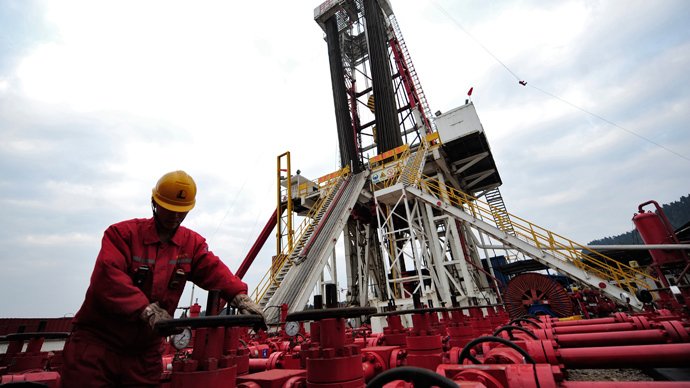Beicology: Could Fracking Save Beijing's Skies?
China may be gaining acclaim as of late for its heavy investments in wind turbines and solar panels, but Elizabeth Muller thinks that’s not enough. In a recent article for the Huffington Post, the California-based environmentalist (who co-founded and heads up Berkeley Earth, self-described as "an independent research organization primarily engaged in scientific work on global warming and air pollution") raised eyebrows by arguing that China's ecological wellbeing relies on shale gas. Despite the controversy that comes with that fuel source – extracted through a practice commonly known as "fracking" by critics who claim the process causes earthquakes, illnesses, among other concerns – Muller says anyone residing in China should not be quick to dismiss it, even if once notoriously smoggy Beijing has had bluer skies as of late. Below, Muller makes her case for fracking in China.

Tell us about your background
For the past eight years, I have run the environmental organization that I co-founded, Berkeley Earth. Berkeley Earth was created to study global warming, though we have more recently expanded into air pollution. After completing our initial study showing that global warming is real and human-caused, and responding to major concerns raised by skeptics about the previous methods used, we turned our focus to looking at what to do about global warming. This focus led us to China, since China currently has about twice the emissions of the United States, and is still growing. Meanwhile, emissions in the United States are on the decline.
We spent three years deeply involved in China, which led us to create Berkeley Earth's program on air pollution. During this time I took many trips to Beijing and other parts of China, with a focus on reducing greenhouse gas emissions and solving the air pollution problem.
What did you see during those trips that prompted you to write in your article: “the political climate in China didn’t seem open to doing what needs to be done"? Is China not doing what "needs to be done" by remaining in the Paris Climate accord even after America pulled out last year? And how about China's heavy investments in renewables?
We know that the single biggest reason that emissions in the United States have gone down is because of the shift from coal to natural gas. Despite major efforts to encourage wind and solar, these have not had nearly as big an impact. There are still many technological barriers to adoption of wind and solar on the scale needed to make a major reduction in greenhouse gas emissions – the biggest being the intermittency problem. Countries like Germany, that have had a big push toward wind and solar while reducing nuclear power, have actually seen emissions rise, as they require more coal to supply power on days on which the sun doesn’t shine and the wind doesn’t blow.
I am not at all optimistic about China’s push toward renewables and “green” energy, except to the extent that it includes nuclear power and switching from coal to natural gas. These are the two biggest levers that China has to make a meaningful impact on reducing greenhouse gas emissions.
Serious reductions in greenhouse emissions do not come from climate change leadership nearly so much as from smart economic policy. For example, President Trump may not believe in global warming, and may pull the United States out of the Paris Agreement, but he might also have a positive impact on US greenhouse gas emissions by supporting nuclear power. I believe that the international program to fight climate change is deeply flawed, and I am not at all optimistic that it will achieve meaningful results. I am optimistic that greater use of nuclear power, switching from coal to natural gas, and energy efficiency can have a meaningful impact on reducing greenhouse gas emissions in the short to medium term, even as we encourage zero-emission technologies for the longer-term.

You also wrote in your article: “I believe that the solution is actually quite simple. China must develop its shale gas resources. It has plenty of shale gas, an estimated 50 percent more than the United States, which is known for its tremendous shale resources. If China could switch from coal to natural gas on a massive scale, as the United States has done, that would reduce air pollution in China by a factor of about 400.” How did you arrive at this conclusion?
We spent three years deeply involved in China, thinking about what China could do to make a meaningful impact in reducing greenhouse gas emissions. We spoke to government officials, oil and gas companies, investors, university professors, and environmentalists in China. It is well established that China has 50 percent more shale gas reserves than the United States. See, for example, data from the Energy Information Administration. However, there is considerable false information about how China cannot access these reserves – for example, because of lack of fresh water, because the geology is different, and so on. One by one we were able to show that these reasons do not hold up to serious scrutiny. Fresh water is not required for shale gas extraction, brines work just as well, and China has plenty of brines near shale basins. The geology is different, yes, but so is the geology of each new play in the United States. This means that you can’t copy and paste shale gas extraction techniques - you need to innovate for every new discovery.
China needs more innovators to explore its natural gas. But this will be highly risky. Forcing companies to buy at auction the right to explore a basin does not make sense. Most companies that try will fail. A free-market approach is required, with low barriers to entry, many companies trying, most failing, and a few succeeding. After three years in China, we determined that the government is not currently inclined toward this approach.

Shale gas is hugely controversial in the US, and there are many outspoken critics of what they call “fracking.” I think the environmental risks, and the outspoken critics, make it far from a “quite simple” solution, as you have described.
As I mentioned earlier, switching from coal to shale gas in the United States has been the single biggest reason for the decline in US emissions. The environmental risks can be mitigated. While there were some real problems in the early days of shale gas exploration in the United States, these have now been stopped through sensible regulations and industry best practice.
For more detail on this, you can read our report “Why Every Serious Environmentalist Should Favour Fracking.”
Why wouldn’t renewables like solar and wind power be a better alternative than shale gas?
For the long term, I am very optimistic about renewables. I think that 30 years from now they may be able to move us to a carbon-neutral future. But I am concerned about the emissions that will happen over the next 30 years. And renewables are not yet ready to take on baseload capacity. Energy storage is still too expensive. We are not there yet.
In the meantime, we need shale gas, nuclear, and energy efficiency. These three can dramatically reduce emissions today, while we continue to pursue solar, wind, and batteries for the next generation.
Beijing’s skies are quite blue this winter. Do you have any thoughts on this, and how it pertains to your argument that China should use more shale gas?
You might consider Beijing’s skies to be “quite blue,” but that is highly misleading. Over the past 30 days, Beijing’s air has averaged “unhealthy” (you can read more about that here). That said, there does seem to be a significant reduction in Beijing’s air pollution compared to last year, and the year before. This is very exciting. Air pollution is still a horrific problem, but at least China is moving in the right direction.
More stories by this author here.
Email: kylemullin@truerun.com
Twitter: @MulKyle
Instagram: mullin.kyle
Photos: Marketplace, Invisible Dust, Berkeley Earth, rt.com, The Telegraph,







